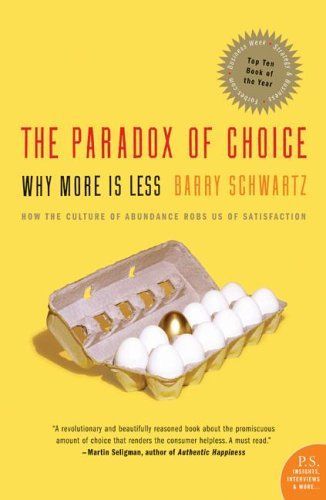
The Paradox of Choice Why More Is Less
The author of The Battle for Human Nature explains why too much choice has led to the ever increasing complexity of everyday decisions, why too much of a good thing has become detrimental to human psychological and emotional well-being, and how to focus our lives on making the right choices. Reprint. 35,000 first printing.
Reviews
Sarah Schumacher@smschumacher
Yuval Shoshan@yuvals
Bouke van der Bijl@bouk
Ivaylo Durmonski@durmonski
Lin@llin
garima mamgain@garima
Kevin Wammer@cliophate
Wingyan Chan@wingyan
Ed Macovaz@edmacovaz
Luca Masters@lkbm
MK@easyfriday
Róbert Istók@robertistok
Mike@mikeyt
Andre Schweighofer@dre
Ana Ferreira@ana
Alexandra Sklar@alexandrasklar
Sierra Nguyen@sierra-reads
Yunna Ducharme@yuducharme
Neverland ✨@haneen
Vedat Baday@badayvedat
Rachel Kwon@kwon
Fatih Arslan@fatiharslan
Matthew Bischoff@mattb
Julia R. Santos @julesreads
Highlights
Serah@serah
Serah@serah
Serah@serah
Serah@serah
Serah@serah
Serah@serah
Serah@serah
Serah@serah